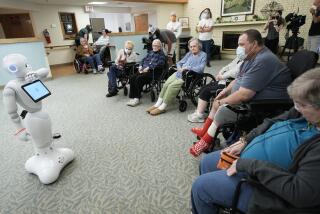Program teaches computer skills to older generation
Thirty senior citizens squeezed around a long table designed for about 20, the crush made tighter by canes, walkers and wheelchairs. As late arrivals wriggled between others in search of a seat, snippets of conversation floated from the chatty crowd.
“I don’t have a computer. I don’t have any of that Google stuff,” one exasperated woman said. “Facebook? What’s that?” another asked loudly, to no one in particular. “It’s a program. It’s a computer program,” a man responded knowingly, displaying a confidence rarely seen in the 75-and-over age group when talk turns to laptops, PCs, iPads, smartphones and all that comes with them.
That’s why these seniors had gathered at the Hallmark, their assisted-living facility in Lower Manhattan. They wanted to begin the task of catching up with a technical world whose rapid-fire evolution has left much of America’s oldest generation isolated from its children, grandchildren and tech-savvy friends.
“It’s so hard to do. But at least I’ve stopped crying,” said Roz Carlin, 92, speaking for many as she described breaking down in tears when she first tried using a computer. Like most of the students, Carlin initially resisted the technology until her daughter forced the issue by giving her an iPad.
Now, after mastering email, she was back to learn more.
Their teachers were students from New York’s Pace University who earn credits participating in a program to bridge the gap created by the computer age.
“Let’s face it — 20% of the population is going to be over 65 by 2050,” said Jean Coppola, a gerontologist and information technology professor at Pace who started the program after officials in Westchester County, north of New York City, asked the university to conduct a computer seminar for senior citizens in 2005.
It proved so popular that Coppola expanded it, and it has become a model for similar efforts nationwide. She now has more seniors clamoring for the seven-week course, at senior facilities in Manhattan and in Westchester, than she has students to teach them.
Like the seniors signing up for the once-a-week tutoring sessions, Coppola knows that it is best to look outside the family for someone to teach elders the art of double-clicking, dragging and dropping, emailing, and ignoring spam that promises fabulous wealth or a free cruise.
“A son or daughter can’t teach the 80- or 90-year-old computers,” said Coppola, who tried to teach her grandmother computer tricks. “There’s too much baggage there — emotional baggage. People get very funny — they don’t have the same patience with their mom or their dad or older relatives that they have with a stranger.”
The gap between young and old quickly came into view as the seniors introduced themselves to their tutors, most of whom were in their early 20s.
There was Dorothy, an elegant woman in a red vest, whose children had insisted she get a computer. She compared using it to trying to understand a second language. “It’s that foreign to me,” she said.
“I’m completely computer illiterate, except to play solitaire,” said a woman named Anita.
“This gadget scares the living daylights out of me,” said Frances, who was embarrassed to admit that she didn’t know the make of her computer. “I’ll tell you the truth, I almost got rid of the damned thing. It got a virus. Then it got frozen.”
Several had taken the course before but had forgotten what they learned or were hampered by poor eyesight and other limitations, such as arthritic fingers and fading memories. Virtually all of them, though, said they needed to learn so they could keep in touch with distant relatives and friends, and see photographs of children and grandchildren.
“It scares me,” Edythe Eisenberg said of her iPad. “But when I call my kids and grandkids they don’t call back, so I have to use email.”
Before the one-on-one tutoring sessions could begin, students were put through what Coppola calls “sensitivity training,” a class designed to give the young teachers an idea of the ailments facing their elderly charges. It is conducted by Sharon Stahl Wexler and Lin Drury, registered nurses and Pace professors who work with Coppola on the program.
“We’re going to have a lot of fun!” Wexler told the slightly dubious-looking young crowd as she and Drury passed out props. They included earplugs to stifle hearing; unpopped popcorn to put into shoes to give the feeling of corns and calluses; tape to bind fingers into arthritic-like claws; glasses to emulate vision problems.
There were boxes of clementines to peel while wearing gloves; tiny pill boxes filled with fake medications to be carefully picked through; and a page of the telephone book, to be read while wearing the special glasses.
For extra credit, there were adult diapers, which students were invited to dampen and wear for a few hours while seated in front of a computer.
“They’re fun for the first couple of minutes, but imagine needing those implements to walk,” Wexler said as the trussed-up tutors meandered the hallways using walkers, crutches, wheelchairs and canes. They included Alice Simmons, a theater major, who was being pushed in a wheelchair by Katie Allen, a history major.
A few days later, both of the young women began their tutoring sessions back at Hallmark.
One of Simmons’ students, 91-year-old Pauline Lockman, had taken the course before but was rusty. She wanted to learn how to reply to incoming emails, and she struggled for nearly an hour to tap out a few lines to a friend who had emailed her more than a month earlier.
Lockman labored over details that the younger generation often ignores when writing on computers. As she leaned in toward the screen, straining to read its 16-point text, Lockman pondered whether to capitalize the start of each line, what to write in the subject line, and how to spell certain words. When she was finished with her brief message, she didn’t want to send it because, she told Simmons, it wasn’t good enough.
“No, that’s not sendable,” she said firmly despite Simmons’ gentle prodding.
“The hardest part for me is not touching the mouse or computer myself,” Simmons said later. Like the other tutors, she has been advised to make the seniors do things for themselves.
The challenge, she said, is helping people like Lockman overcome their fear of computers and the Internet, while also teaching them the perils of pop-up ads and virus-carrying attachments. “It’s hard to say, ‘Don’t be scared to click on anything, but be scared to click on these,’ ” she said.
That’s a comfort level that usually requires more than one pass through the course, said Coppola, whose oldest student was 101.
“The third or fourth time, something clicks,” she said. “By the second time, they’re beginning to understand. By the third or fourth time they’re comfortable with it. They’re no longer confused. They’re no longer afraid.”
That’s how it was for Eisenberg, who met with Allen in her sunny, cream-colored 13th-floor apartment. She had been through the course twice — enough to feel comfortable flicking on her iPad and checking her email for the daily message whose subject line was “Thought for the Day.”
But Eisenberg, who moved to New York from Florida to be close to her daughter, a Broadway producer and actress, was stalled. Her son had set up an Amazon account for her so she could buy books online, but she had forgotten how to log in and did not want to call her son for help.
“I hate to keep admitting defeat,” said Eisenberg, who had yet to figure out how to view the family photographs that she knew were somewhere on the iPad.
Allen leaned in and guided her toward the flower icon, then showed her how to tap it to reveal pictures of her children and grandchildren on vacation. “I’m seeing these for the first time,” Eisenberg said in wonder as the screen filled with photographs of a smiling little girl with dark, glossy hair.
Then, Eisenberg clicked on another icon and fell into a trance-like silence as the voice of her daughter, Jana Robbins, belting out “I’m Still Here” from the Broadway musical “Follies,” floated from the iPad and filled the room.
“At first I didn’t know anything,” Eisenberg said, “but I’m picking it up, piece by piece.”
More to Read
Start your day right
Sign up for Essential California for news, features and recommendations from the L.A. Times and beyond in your inbox six days a week.
You may occasionally receive promotional content from the Los Angeles Times.







